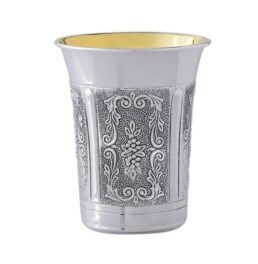Tips for Taking Care of and Cleaning Sterling Silver Jewelry and Judaica

The bad news: All authentic 925 sterling silver metal will inevitably turn black or green after long periods of exposure to air and greasy residue from our bodies.
The good news: With proper (and easy!) care, sterling silver can be cleaned and maintained so it will keep its shine for years to come.
What causes sterling silver to turn black?
- Contact with air
- Contact with various acidic kitchen items such as vinegar, wine, lemon, or salt
- Contact with detergents, such as bleach
- Contact with skin and sweat
- Exposure to ocean and sea water
How can I preserve my silver item and prevent tarnish?
We strongly recommend keeping sterling silver Judaica in a closed display case and to avoid exposing these items to air, salt, heat, excessive touch, etc. When you do inevitably need to touch the item, we advise using gloves or a clean cloth to prevent any tarnish from occurring.
Does it matter where I keep my sterling silver Judaica?
Yes! Silver will turn black faster if it is kept in the kitchen, near an air conditioner, or any areas of your home that are warmer or have higher levels of humidity.
How do I clean my sterling silver items?
Sometimes it is enough to clean with a wet cloth and soap. If a lot of tarnish is visible, it is worthwhile to buy a silver cleaning solution. Pay attention to what kind of silver cleaning you purchase, as there are solutions that are specifically for chains or engravings. If the product is an antique or extremely valuable, there are also professional silver cleaners that can ensure the product is cleaned with care.
Smooth silverware should only be cleaned with soft cloths. Other sterling silver items (with decorative filigree, engravings, or matte features, for example), can be cleaned by gently rubbing the item with steel wool. Only try this method when the item is completely dry! And always dry your sterling silver items after cleaning. Leaving the items to air-dry can cause damage.
When should I clean my sterling silver items?
This depends on the frequency of use. For example, jewelry that is frequently worn will need to be cleaned more often than a menorah.
Tips for cleaning sterling silver Kiddush Cups
- When wine comes in contact with silver, it causes oxidation, which is why many Kiddush cups come with a gold lining. Use the interior lining cup to maintain the silver’s condition.
- After each use, rinse the Kiddush cup with water. Do not use soap. Dry gently with a soft cloth. Make sure you don’t leave any water droplets, as this can cause stains on the cup.
- It is safe to clean the cup if it is already displaying signs of tarnish, even if you haven't used it yet or recently.
- There is no need to use any type of soap, even on the gold interior lining. Water and a soft cloth are enough.
Tips for cleaning sterling silver candlesticks and menorahs

Menorahs and candlestick holders used on Shabbat, holidays, and for Havdalah on Saturday night will become tarnished more quickly because of their exposure to heat, wax, and hands. It is important to clean them after each use.
- Try to avoid direct contact between candle wax or oil and the sterling silver, as it can lead to tarnish and long-term damage.
- Use soapy hot water and a cloth to remove any grease or wax that does come in contact with the silver parts of the candlesticks or menorah. Wipe the items dry with a clean cloth afterwards.
Did you know? Silverware collectors usually prefer not to clean their silverware at all because it maintains the authentic appearance. Cleaning too often or too hard can also result in thin layers of the item coming off without you even realizing it!

